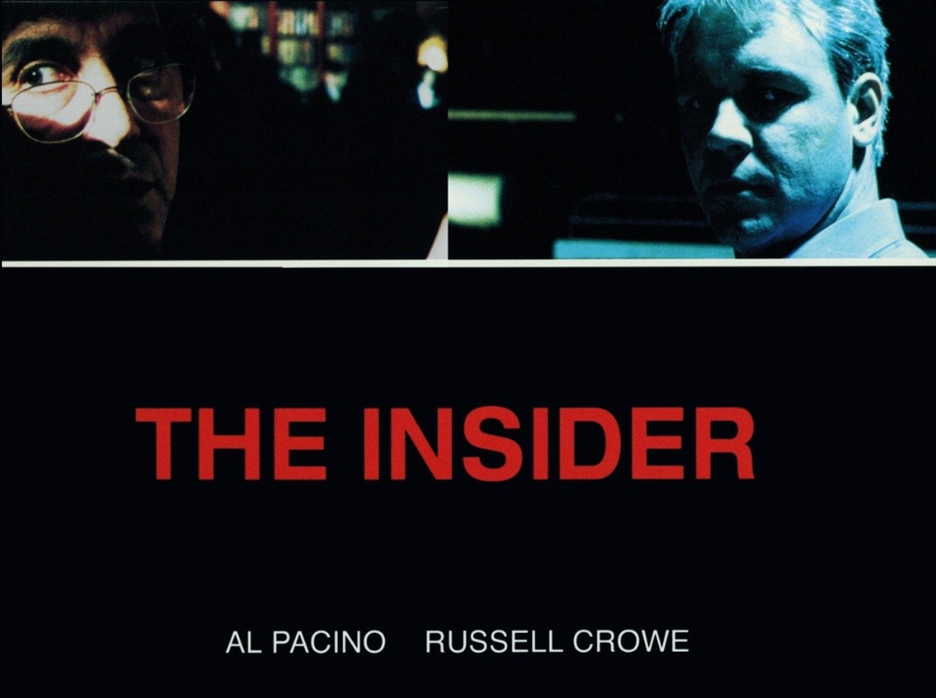The Insider (1999, Dir. Michael Mann)

The Insider is not a movie about the law per se. Like most Michael Mann movies, it’s about men engaged in an operatic, high-stakes dance with each other and with the fates, coming together and splitting apart in a flurry of paradoxically macho sensitivity. It’s about the sacred bond between a journalist and his source, and the troubling divide between the noble work journalists do and the corporate interests of their employers. As such it’s one of the great journalism thrillers; there’s no heresy in mentioning The Insider in the same breath as All the President’s Men.
But there is, in fact, a lot of law in The Insider, and a fair number of lawyers. There’s a deposition scene guaranteed to get your blood pumping — if you’ve seen the movie, you already know what I’m talking about — and a legal concept, tortious interference, that few outside the legal field knew anything about before The Insider came along.
In The Insider the law is presented as both a dignified means of getting at the truth and a refuge under which cowards take cover. Like another great journalism thriller, Absence of Malice, Mann’s film deftly illustrates how law and journalism often march in lock step, one facilitating or impeding the goals of the other.
A brief primer for the uninitiated: Released in 1999, based on Marie Brenner’s Vanity Fair article “The Man Who Knew Too Much,” The Insider unfolds in waves of crises. Lowell Bergman (Al Pacino), a producer for the venerable CBS news magazine 60 Minutes, fights to help tobacco scientist Jeffrey Wigand (Russell Crowe) blow the whistle on his former employer, Brown & Williamson, and the corporation’s practice of knowingly spiking their cigarettes with addictive chemicals. The company allegedly terrorizes Wigand and his family, but at least he’ll get his voice heard.
Oops.
CBS, on the verge of a lucrative merger with Westinghouse, gets cold feet and butchers the 60 Minutes segment, neutering it of its power and hanging Wigand out to dry, all the while hiding behind the aforementioned tortious interference, which occurs when a party causes economic harm by intentionally interfering with a contractual or business relationship between other parties. As if that doesn’t make Bergman’s job hard enough, he also has to prove the fallaciousness of a Brown & Williamson’s smear campaign against Wigand, step by step, lie by lie.
The lawyers in The Insider are both heroes and villains. One, Bruce McGill’s Ron Motley, provides the movie’s most potent jolt of energy. Curtailed by the terms of his corporate confidentiality agreement, Wigand travels from his Kentucky home to Mississippi to give a deposition in that state’s lawsuit against big tobacco — the idea being that if he goes on the public record his agreement will be negated and he can spill the beans on 60 Minutes. Faced with a smug tobacco lawyer (Wings Hauser) bent on keeping Wigand from giving his deposition, Motley reacts with fury. As the tobacco lawyer’s glibness levels rise, Motley brings down the hammer: “Wipe that smirk off your face!”
It’s a transfixing moment, a classic burst of Mann machismo, accentuated by the silence that hangs in the air as the tobacco lawyer’s expression switches from smug to terrified. Wigand does indeed give his deposition. (Side note: Emboldened by this scene, I once tried the “Wipe that smirk off your face!” line on an annoying student in a film class I was teaching. I got in trouble. It was worth it.)
Then there’s Helen Caperelli (Gina Gershon), the CBS chief legal counsel based on the real-life Ellen Kaden. Caperelli is the one who raises the specter of tortious interference in a meeting with disbelieving CBS news staff.
Bergman’s response: “That sounds like a disease caught by a radio.”
But he soon realizes it’s no laughing matter. Cowed by the impending merger, CBS guts the Wigand piece with a thoroughness that infuriates Mike Wallace (Christopher Plummer), who tees off on Caperelli when she dares to call him by his first name: “‘Mike’? Try ‘Mr. Wallace.’ We work in the same corporation, doesn’t mean we work in the same profession. What are you going to do now? You’re gonna finesse me, lawyer me some more?” Wallace wasn’t happy with the way he was portrayed in The Insider; indeed, the character in the film capitulates rather easily. But here he gets his moment of righteous indignation.
The film is a high-water mark for Crowe, subsuming his ego into a deeply flawed character and a doughy physique, and Mann, who leans into the story’s complexity and scales one emotional peak after another. Pacino’s performance is among his best, fiercely intelligent with plenty of the Big Moments for which he has long been known. “I’m getting two things,” he tells an FBI man after Wigand is intimidated by Bureau agents. “Pissed off and curious.” Pacino’s Bergman is the kind of journalist a source wants in their corner and a reporter wants to cheer for.
I return to The Insider frequently. As a movie critic and movie lover I thrill to its mastery of visual detail and narrative. As a journalist I find inspiration in its depiction of a newsman who will go to hell and back for his source. And as someone who has spent most of his career in corporate media I note the shame of a proud news organization buckling under pressure from the suits. In short, The Insider gets me fired up. Now wipe that smirk off your face.
